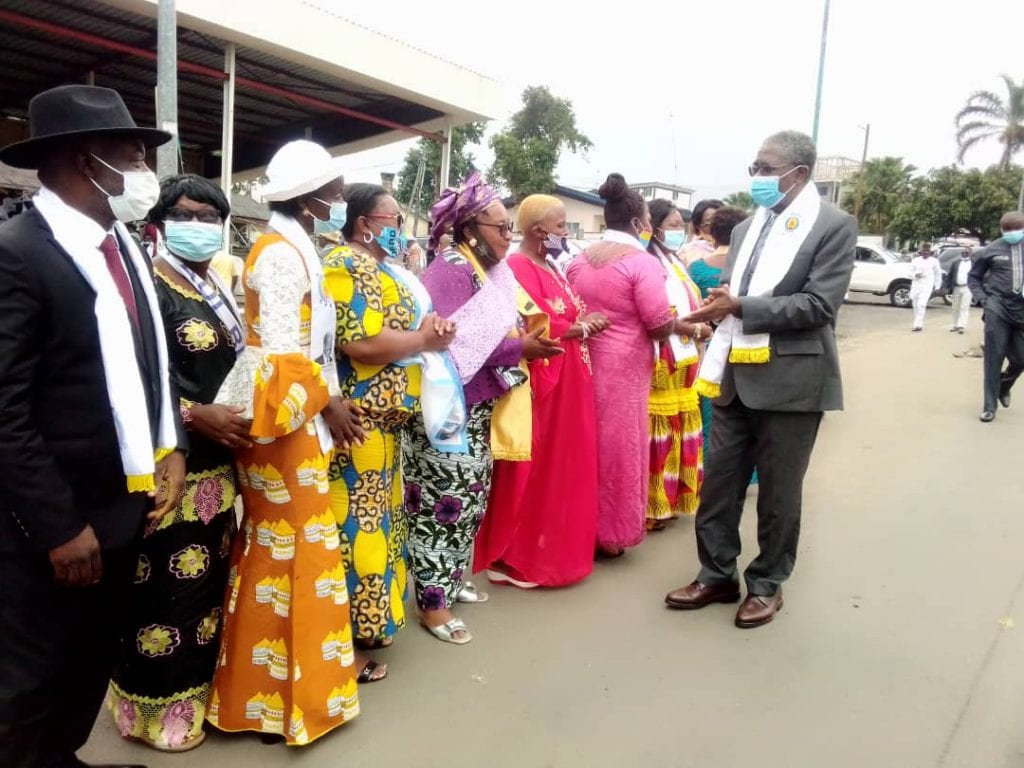By Hope Nda
The Southwest Regional Campaign Manager of the Cameroon People’s Democratic Movement, Peter Mafany Musonge, has challenged CPDM Councillors to vote massively in the forthcoming Regional Elections.
He was speaking in Buea, Saturday, November 21, while launching campaigns for the Regional polls.
“We are going to have the Regional Assembly and a House of Chiefs, which are important aspects of the Special Status, and so they should help us realise it by voting massively on that day,” Musonge said.
The campaigns will be taking place amid widespread violence in the Northwest and Southwest Regions.
At the Buea Independence Square where the Regional campaigns were launched, scores of CPDM militants were enthusiastic and seemed undisturbed about any possible security challenges during the elections.
According to the Mayor of Buea, David Mafany Namange, the Municipality is prepared for campaigns and CPDM Councillors in the municipality should support the CPDM Central Committee by voting massively.
He said the launching ceremony has “fortified” militants for the upcoming political challenges.
The first Regional Elections may, however, not be very challenging for the ruling CPDM, especially as the two main opposition; the Social Democratic Front, SDF, and the Cameroon Renaissance Movement, CRM, parties are boycotting the elections.
This will enable the party to claim the remaining Councils, especially in the Northwest Region (where the SDF party is most powerful).
The CPDM claimed more than 60 per cent of Municipal seats nationwide in the Municipal and Legislative Elections, winning all councils in eight divisions of the Centre Region and 32 Councils out of 33 in the East Region.
Since 1992 Presidential Elections, the opposition has often accused the ruling CPDM of rigging most elections, including 2018 Presidential Elections, to keep long-serving President, Paul Biya in power.
In January 2019, CRM party leader, Maurice Kamto, launched a nationwide protest against results of the 2018 elections which he claimed was rigged in favour of the CPDM.
Many political actors in the country are questing for more decentralisation of power and that local authorities should be able to take decisions for their people and not follow long protocols.
This is the case of the Northwest and Southwest Regions where the quest for more autonomy has plunged the Regions into a four years crisis.
The Regional Elections is an outcome of a 2019 Major National Dialogue that was meant to discuss the crisis in the Northwest and Southwest regions.
Government says Regional Councils will ensure more decentralisation and will help each Region to deliberate and manage its own developmental affairs.
However, appointed Regional Governors will remain in place and will supervise activities of the elected Regional Councillors, said Isaac Mbua Embole of the Ministry of Decentralisation and Local Affairs.
“We are in the last phase of decentralisation of the process and the election of December 6 is the highlight of the process,” Musonge said.
Traditional Rulers & The Regional Elections
The December 6 Regional Elections will revived the once abolished House of Chiefs in the Anglophone Regions, but this time it will not be an independent house as it was in the 1970s.
But the autonomy commanded by the historical Southern Cameroons House of Chiefs, which was later dissolved, will be far-fetched in the upcoming HOCs, who will be an integral part of the Regional Council supervised by the Regional Governors.
The House of Chiefs is given only to the English-speaking Regions, and will be absent for the other eight Regions of the country.
20 Chiefs will be voted by their fellow traditional rulers and they will work with a 70-member Regional Assembly under the Governor’s supervision.
Although many traditional rulers of the English-speaking Regions are out of their palaces due to the crisis, some of them are optimistic and will contests for the elections into the House of Chiefs, and are hoping to give their populations their ‘best’.
In Fako Division, Chief Richard Ndike, Paramount ruler of Mondoni, is contesting the elections alongside Chief Emmanuel Etina Monono and Chief David Nanyowe.
“The Chiefs are readily prepared for it. The population should expect from us the contribution to ensure that the economics of this Region changes the position where we are. We want to assure them that what we have at our disposal we shall give them the best of it,” said Chief Richard Ndike to the press.
The traditional rulers, alongside the Regional Assembly of 70 Municipal Councillors will oversee issues of education, vocational training, youth empowerment culture, etc, of the regions.
They will also be consulted when policies are being defined concerning Anglo-Saxon educational system.
The House of Chiefs will be instrumental in deciding the status of traditional Chiefdoms – whether they are first, second or third class Chiefdoms.

1 comment
Your article helped me a lot, is there any more related content? Thanks!